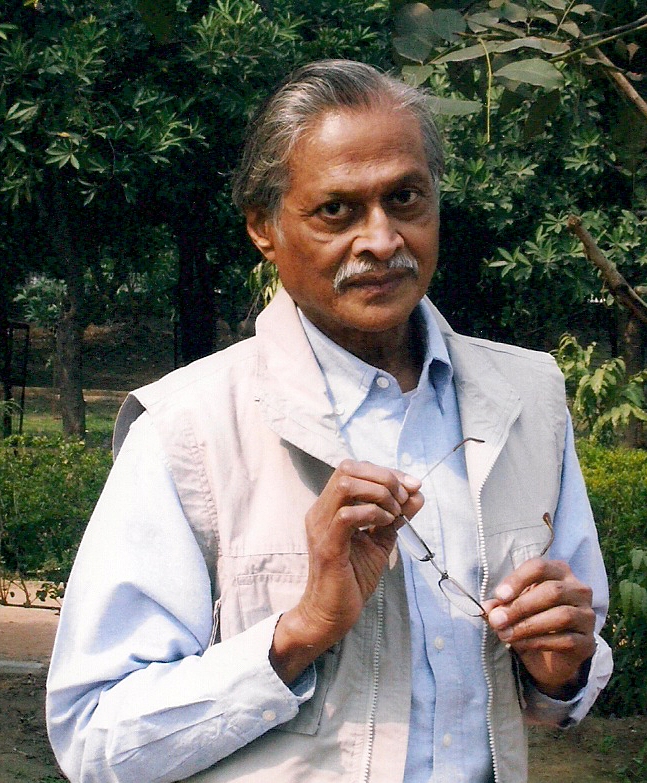
He stands tall, unbending in his demeanour and stature in the journey since the late forties (1949) when his first poem was published in Kumkum. So much like a scuba diver, he dives deep, is self-contained and perennially observant. A typical litterateur of his times in Odisha or of Odisha origin fell into two brackets – civil servant and non-civil servant. He chose not to two-time his first love, literature and quit the elite Indian administrative career, for which he prepared in the then “Oxford of the east”, Allahabad University. He taught at the University too and is known among peers, juniors, seniors as a brilliant student, topper in MA. All through from his Banpur early school days he has been a topper. Passion warrants compromise. The could-have-been Cabinet Secretary of India, chucked it all and pursued writing. I have never ever heard him brag this. Probably because greatness comes in simple steps, steps which we find daunting and unthinkable in an Odia household. An administrative service job, in Odisha is considered nothing short of a ‘lightening from the skies’ and the ‘greatest benediction’ in life. More so in the late fifties when he was 22. His first poem collection was published seven years before his joining IAS. Many turn writers after they secure their material comforts as an officer, but he wrote because that was his natural calling since Banpur and Cuttack school days, when he topped in his class and dared dream through his classroom windows. He is a dreamer and yet quite ‘still’. I have found this combination, exuding through his piercing eyes, quite astonishing.
His Saraswati Samman recognised his first love, poetry – “All that I want to say, let me say in poetry” and his seminal Prathama Purusha changed the quality of readership in Odia. Invincible, it is difficult to influence him – in ideologies, roller-coaster trends or with the insecurities of getting awarded as the stamp of greatness. He has stood his ground, honourably and unobtrusively.

Jagannath Prasad Das is certainly a non-conformist but not an iconoclast or a complainant. This is unique. He thinks that Odisha is full of budding intellectuals and currently there are many templates and formats to express creativities and not necessarily only print writing, which was the inevitability of his times. He is as comfortable as ever, living now in Bhubaneswar after having spent decades in Lutyens Delhi amidst the culturati of India and evenings at India International Centre, his favourite haunt for many decades. With him doyens like Mulk Raj Anand, Gulzar, Ravi Baswani, Nissim Ezekiel and others have been in consistent conversation but have never awed him. That reflects his respect for individual and collective spaces. He belongs to the old guard and yet he does not. Rarely does he dwell in the past. This in itself is a rarity and happens to people, immersed in work, incessantly. Currently he is engaged in penning a new novella, after a long time. The pollution of Delhi has played havoc with his health and had to take short sabbaticals from writing.
JPD flirts with formats – poetry, plays, short stories, novel, essays, children’s poems. A renaissance man, JPD started at a time when competition among Odia writers was acute. Though civil but the range was limited and hence the race to be visible was often quite mean and political. But JPD spent almost all his time in researching and digging facts and not racing. One can sense his almost meditative engagement in Desha Kala Patra, a novel but historical, based on the changing social mores and times in late 19th century. Vikram Seth’s Suitable Boy was published a year later and by then I had finished this six-hundred-page novel, a treat in romancing vintage Odisha and its different shades of life. It is a literary classic and deservingly has been translated into various Indian languages.

Odia literature suffers from a severe dearth in translations – both Odia to other languages and vice versa. Barring Nandini Satpathy, Ananta Patnaik and a few others Odia writers rarely translated or got translated. The culture of a state does not get ventilation without translation. JPD’s contribution to Odisha culture and its dissemination can be gauzed form his body of translation works – translated Odia Women Poets’ Work into English, Catherine Clement’s poems into English, Gulzar’s poems from Urdu into English, Werner Aspenstrom’s poems into Odia, Lakshmipurana into English and more. When I quizzed him specifically about his choice of Lakshmipurana as he is a self-confessed atheist, his repartee was that “it is about the evil of untouchability and gender atrocity” in one story. He does not wear atheism on his sleeves, nor does he make it his brand. He is as ‘matter of fact’ as always and as in everything else in his life. While translating many international literatures into Odia he has worked with names like Arlene Zide, the French writer Catherine Clement, the Swedish poet Werner Aspenstrom and K.Satchidanandan.
So, he might have churned less titles in all these decades ( over five decades ) but each one of his is considered a master craft because of the detailed collocations with the times and the nuances. His plays Suryasta Purbaru, Saba Sesha Loka , Sunderdas have been staged at the national levels, included in the repertoire of NSD, JNU and translated to other languages including English. JPD has acted on stage, albeit in cameo roles but has been a keen practitioner of arts, in various forms. Not sure whether he ever had any interest in fine arts, but his association with cinemas has been remarkable. His examination of Patta Chitra is considered a ground-breaking reference compendium on the most famous style of painting in Odisha. Besides holding positions – national Film award jury member or board member children’s film society of India, his love for films and discussions about them is intense and valued.
Jagannath Prasad Das has been an eminent icon of Odia literature. Much beyond the awards (Central Sahitya Academy award which he refused, Nandikar Award for plays, the Sarala Award for short stories and the Saraswati Samman, he is a mentor to many young writers and thinkers. Because he does not carry any baggage of basking in past glories, he is mentoring many young minds of Odisha. Very contemporary, JPD school has a distinct identity. It is walking the fine line between the romance of imagination and factual juxtaposition. Reality and romance travelling together is a unique trip.
Unfailingly I try to meet him at Bhubaneswar, as often as possible, and almost always take an enthusiast along with me. The more we hear him, the more we get enlightened. Time has come when we need to foster a tank of thinkers in Odisha – young and new age. JPD is the culture rebbe (not confined to literature only). Odia society is in immediate need of creative oxygen. Leafing through Jagannath Prasad Das legacy is like visiting a bright room with many windows to different worlds – letters, thoughts, drama, cinema, history, culture and as many as we can mine. Poetry books, short stories, Odia plays, Odia novels, childrens’ literature, anthologies, research papers, essays, English translations, Odia translations, the inventory is both wide and deep. Many more are in the offing.
His parents had named him appropriately – Jagannath Prasad, gift of the Lord. I am sure he would dismiss this simile, as self-effacingly as always.
ଶ୍ରଦ୍ଧା ସୁମନାସ
ଚାରୁଦତ୍ତ ଭାଇ
ଅତି ଉତ୍ତମ ଓ ତଥ୍ୟପୂର୍ଣ୍ଣ ଆଲେଖ୍ୟ।
ଜଗନ୍ନାଥ ପ୍ରସାଦ ଦାସ ଜଣେ ଅନନ୍ୟ ସାହିତ୍ୟ ସାଧକ।
-ପ୍ରଭୂ
ଶ୍ରୀ ଜଗନ୍ନାଥ ପ୍ରସାଦ ଦାସଙ୍କ ସହ ମୋର ବ୍ୟକ୍ତିଗତ ସମ୍ପର୍କ ଅନେକ ଦିନର। ସବୁ ସମୟରେ ମୋତେ ଲେଖିବା ପାଇଁ ଉତ୍ସାହିତ କରିଛନ୍ତି। ମୋ ପାଇଁ ସେ ବଡ଼ଭାଇ ପରି। ସେ ଓ ମିତ୍ରା ଅପା (ମିସେସ୍ ଦାସ ) ଆମ ପାଇଁ ଅତି ଆପଣାର ।ତାଙ୍କର ଦୀର୍ଘ ସ୍ୱାସ୍ଥ୍ୟ ପୁର୍ଣ୍ଣ ଜୀବନ କାମନା କରୁଛି।
ଅଭୟ ଦାଶ
JP is many layered and versatile. Thanks Charudatta, for writing such an excellent prologue to his large opus. A persistent research in to his own mint of personal experience must continue as he is disarmingly private.
Writing about JP Das is not only about the literary genius, it is about a phenomenon in Odia literature. Being fiercely unassuming and self effacing, the posterity might miss to notice his marks. It is our bounden duty to chronicle such gems in all their dazzling dimensions. It is heartening that you have done precisely this! I have had fleeting interactions with him over two decades and can well identify with the facets of his personality. May lord Jagannath bless him with good health and long creative life.
I repeat what I had told him decades ago__I admire your talents and envy your guts.
Thanks Charudatta babu on the indepth analysis on writings and life of Jagannath P Das.I value his writings and learnt past history of Odisha literature from his writings.Met him in Jagannath temple,Delhi and eager to read his new creations.
JP Sir, as I adorably call him, is a true inspiration for me since very long, perhaps for the last 40 years as I completed 44 springs on May 3, 2020 and I talked with him over phone just one day before for the first time and the moment I just caged in the inner hole of my existence.This person is really a big influence on me as I am largely influenced by European cinema,French new wave particularly and my favourite director Francois Truffaut.
Yes yesterday’s incident was surreal like you are talking with your idol flesh and blood.I found that Sir’s voice was a little choked and it’s about that still he was fighting with illness and lungs sensitivity as he told me. At this age(84) also his voice was sparkling and magnificent.
He is always a big time inspiration,gone through many of his poetry,stories, novels and plays,some in full and some in fraction(in continuation). His immense body of work and variety of Genre is simply unbelievable.
I always remember a past time Lori as my father offered me in a moonlit night of our thatched house open space(ଦୁଆର) when he sang ସପନ ର ପଥେ ପଥେ…told me all stories,puzzles and very fondly and excitingly his association with JP Sir since that day to 2014 until his death on and off as he was working under him as a subordinate staff in Kalahandi District collectorate during early sixties.
JP Sir is a great person as he influenced budding artists to open up like me and this is the rarest of rare things you can discover with intellectuals.
He is always a fatherly figure for me and I always pray for his happiness and good health.
I must thank Charudutta Babu for his short writing on JP. JP is great in many aspects. He who has come in contact, once with JP will never forget him for his loving personality. He is a great motivator and inspiring genius. In fact he is friend, philosopher, guide and Guru for many people like me. I have learnt many things from him. I pray for his good health.
I must thank Charudutta Babu for his short writing on JP. JP is great in many aspects. He who has come in contact, once with JP will never forget him for his loving personality. He is a great motivator and inspiring genius. In fact he is friend, philosopher, guide and Guru for many people like me. I have learnt many things from him. I pray for his good health.
Thanks a lot for this beautiful article. Regards
Apart from being informative , this article is also inspirational.
Praying for JPD’s health and happiness.
One wonders what would he chronicle in ‘Desha Kala Patra 2 ‘ ; should he write such a volume on contemporary Odisha which he has seen.